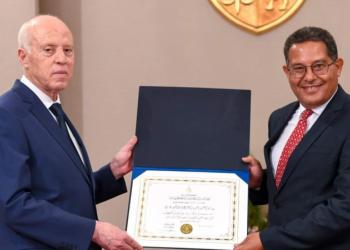News & Stories
2021
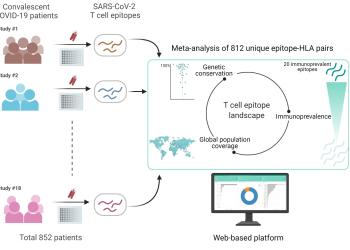
News
HKUST's Meta-analysis Shows SARS-CoV-2 Variants Unlikely to Affect T Cell Responses
In a new study, scientists at The Hong Kong University of Science and Technology (HKUST) have revealed that most T cell epitopes known to be targeted upon natural infection are seemingly unaffected by current SARS-CoV-2 variants.
In their latest research, the team compiled and analysed data from 18 immunological studies of T cell responses involving over 850 recovered COVID-19 patients from across four continents who are well-distributed in age, gender, disease severity and blood collection time. They demonstrated that T cells in these patients targeted fragments (epitopes) of almost all of the virus' proteins, including the spike protein that is a main target of many existing vaccines. As an important finding, based on analysis of over 850,000 SARS-CoV-2 genetic sequences from around the world, most of these epitopes appeared to be unaffected by the current variants of concern.
2020
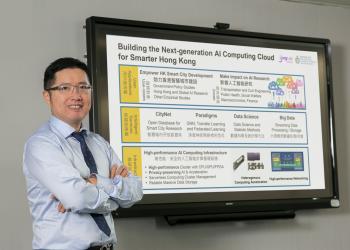
News
Building The Brain Behind Smarter Hong Kong
Prof. CHEN Kai, Associate Professor of Computer Science and Engineering, is now the brain behind what will become Hong Kong’s ‘brain’ in future – the next-generation artificial intelligence (AI) computing hub for the entire city that encompasses smart bus schedules, taxi dispatch, typhoon warning, medical diagnosis, fintech and others.
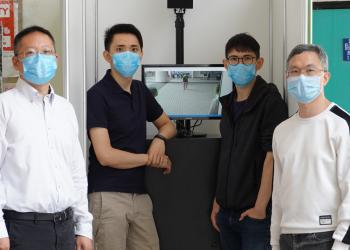
News
HKUST Researchers Develop a Smart Fever Screening System Offering a More Efficient Solution to Safeguarding Public Health
Researchers from The Hong Kong University of Science and Technology (HKUST) have developed a novel Smart Fever Screening System (SFSS), which could help officials at the border points to easily identify and distinguish passengers with fever. The system has been implemented at various control points, government facilities and the University in the fight against Covid-19.
Since the SARS (Severe Acute Respiratory Syndrome) outbreak in 2003, thermal imaging detectors have been widely deployed at border points for screening of inbound travelers with fever – an important symptom for patients of SARS, Covid-19 and other infectious diseases. However, officers would have to monitor two screens on both thermal and color (CCTV) images in order to track the unwell person within a matter of seconds.
2019
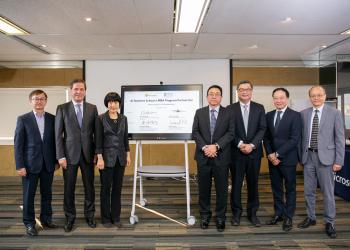
News
HKUST and Microsoft Introduce First AI-Centric MBA Elective in Hong Kong
November 1, 2019, Hong Kong –– Microsoft Hong Kong and The School of Business and Management of The Hong Kong University of Science and Technology (HKUST Business School) introduced today Hong Kong’s first MBA elective featuring an AI (Artificial Intelligence) curriculum. The enhanced curriculum will equip business leaders and organizations with the critical skills, knowledge and culture to succeed in the 4th Industrial Revolution.Officially available for MBA students of HKUST Business School in early 2020, the AI curriculum is part of Microsoft’s Global AI Business School initiative, designed in partnership with INSEAD and provides the latest thinking on AI transformation in business. Business leaders from local enterprises and organizations can also access the AI curriculum by joining the open executive education program provided by HKUST soon to get ready for the AI future.

News
Robo-lawyer: Your AI Conflict Resolution
Getting a divorce is hard, but going through paperwork and court proceedings can leave a deeper scar. A team of HKUST’s Computer Science and Engineering (CSE) students, supervised by professors and alumnus, has developed a “robo-lawyer” that not only saves time and money, but also paves the way for wider application of artificial intelligence technologies in the legal profession.
Hong Kong’s divorce rate in 2016 was more than double that in 1991. The rising demand for family mediation has been a mounting challenge for Albert SO, a CSE alumnus from HKUST, who chairs the Hong Kong Mediation and Arbitration Centre. Few divorcing couples actually realized that the high legal costs and procedural drag would take an emotional toll on themselves, says Albert. Many of them are unwilling or unable to sit down for a mediation that could take months or years, especially for cross-border couples.

News
Go with the Flow to Fix Health Woes
Prof. Jin Qi, Assistant Professor, Department of Industrial Engineering & Decision Analytics
Freshly announced in the budget three weeks ago, a new HK$10 billion stabilization fund has been earmarked to soothe Hong Kong’s manpower-starved public medical sector.
While we welcome the initiative, we can’t help but wonder – if public hospitals are currently short-staffed and new blood requires training time – how we can cope with swamped outpatient clinics during future peak flu seasons?
Media reports last month indicated that every public ward exceeded capacity, with some patients queuing for over eight hours to see a doctor.
The inpatient bed occupancy rates of every hospital, aside from North Lantau and Tin Shui Wai hospitals, exceeded 100 percent almost on a daily basis.
Scarce resources require carefully planned policies to ensure optimal bed allocation and quality services.
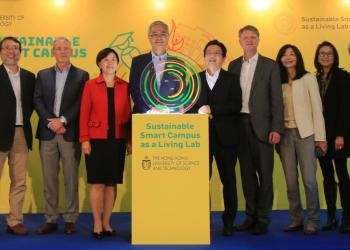
News
HKUST Launches “Sustainable Smart Campus as a Living Lab” Inspiring a Culture for Sustainability Innovation
The Hong Kong University of Science and Technology (HKUST) today launched the “Sustainable Smart Campus as a Living Lab” (SSC) – an initiative that transforms the campus into a testing ground for learning, experimenting, and advancing smart and innovative ideas to address real-life challenges.







